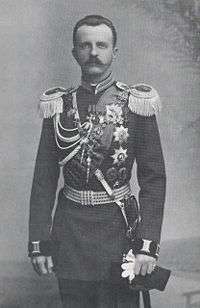Grand Duke Peter Nikolaevich of Russia
Grand Duke Peter Nikolaevich of Russia (Russian: Пётр Никола́евич Рома́нов; 22 January [O.S. 10 January] 1864 – 17 January 1931) was a Russian Grand Duke and a member of the Russian Imperial Family.
| Grand Duke Peter Nikolaevich | |||||
|---|---|---|---|---|---|
 | |||||
| Born | 22 January 1864 Saint Petersburg, Russian Empire | ||||
| Died | 17 January 1931 (aged 67) Antibes | ||||
| Spouse | |||||
| Issue |
| ||||
| |||||
| House | Holstein-Gottorp-Romanov | ||||
| Father | Grand Duke Nicholas Nicolaievich | ||||
| Mother | Duchess Alexandra of Oldenburg | ||||
Early life and marriage
Grand Duke Peter Nikolaevich was the second son of Grand Duke Nicholas Nicolaievich the Elder (1831–1891) and Duchess Alexandra of Oldenburg (1838–1900).
He was born in Saint Petersburg. As was the custom for Russian Grand Dukes (the title applied to all sons and grandsons of a Russian Emperor), the Grand Duke Peter served in the Russian army as a Lt.-General and Adjutant-General.
On 26 July 1889, he married Princess Milica of Montenegro (1866–1951), daughter of King Nicholas I of Montenegro (1841–1921). The Grand Duke and Duchess had four children:
- Princess Marina Petrovna of Russia (1892–1981)
- Prince Roman Petrovich of Russia (1896–1978)
- Princess Nadejda Petrovna of Russia (1898–1988)
- Princess Sofia Petrovna of Russia (3 March 1898 – 3 March 1898); buried in the convent cemetery in Kiev by her grandmother, Grand Duchess Alexandra Petrovna, who was a nun there
Life at court
In 1907, his elder brother, Grand Duke Nicholas Nikolaevich, married Grand Duchess Militza's sister, Princess Anastasia of Montenegro, known as Stana. The two couples were socially very influential at the Russian Imperial Court in the early 20th century. The Grand Duke joined a cult nick-named "the black peril", a group interested in the occult. They are credited with introducing first a charlatan mystic named merely Philippe, and then, with graver consequences, Grigori Rasputin (1869–1916) to the Imperial family. Prince Felix Yussupov (1887–1967) – who was their neighbour in Koreiz – once described Znamenka, the Grand Duke and Duchess's palace, as "the central point of the powers of evil". This was later to be a widely held belief within the higher echelons of the divided Russian court. The Dowager Empress Marie firmly believed that the couple plotted with Rasputin and others to gain influence and favours through the neurotic Empress Alexandra (1872–1918). However, by 1914, Alexandra herself referred to them as "the black family" and felt herself to be manipulated by them.
Honours and awards
The Grand Duke received several Russian and foreign decorations:[1]
- Russian
- Order of St. Andrew, Knight, 1864
- Order of Saint Alexander Nevsky, Knight, 1864
- Order of St. Anna, Knight 1st Class, 1864
- Order of the White Eagle, Knight, 1864
- Order of Saint Stanislaus, Knight 1st Class, 11 June 1865
- Order of St. Vladimir, Knight 4th Class, 1887; 3rd Class, 1901; 2nd Class, 1911
- Foreign
.svg.png)
.svg.png)
- House Order of Fidelity, Knight, 1885
- Order of Berthold the First, Knight, 1885
.svg.png)
_crowned.svg.png)
.svg.png)
Exile
The couple escaped the Russian Revolution to the south of France. Here Grand Duke Peter Nicholaievich died at Cap d'Antibes, near Antibes on 17 June 1931. His wife died in Alexandria, Egypt in September 1951.
Ancestry
| Grand Duke Peter Nikolaevich of Russia (1864–1931) |
Father: Grand Duke Nicholas Nikolaevich of Russia (1831–1891) |
Paternal Grandfather: Emperor Nicholas I of Russia (1796–1855) |
Paternal Great-grandfather: Emperor Paul I of Russia (1754–1801) |
| Paternal Great-grandmother: Duchess Sophie Dorothea of Württemberg (1759–1828) | |||
| Paternal Grandmother: Princess Charlotte of Prussia (1798–1860) |
Paternal Great-grandfather: King Frederick William III of Prussia (1770–1840) | ||
| Paternal Great-grandmother: Princess Louise of Mecklenburg-Strelitz (1776–1810) | |||
| Mother: Duchess Alexandra of Oldenburg (1838–1900) |
Maternal Grandfather: Duke Peter of Oldenburg (1812–1881) |
Maternal Great-grandfather: Duke George of Oldenburg (1784–1812) | |
| Maternal Great-grandmother: Grand Duchess Catherine Pavlovna of Russia (1788–1819) | |||
| Maternal Grandmother: Princess Therese of Nassau-Weilburg (1815–1871) |
Maternal Great-grandfather: William, Duke of Nassau (1792–1839) | ||
| Maternal Great-grandmother: Princess Louise of Saxe-Hildburghausen (1794–1824) |
References
- Russian Imperial Army - Grand Duke Peter Nikolaevich of Russia (In Russian)
- Hof- und Staats-Handbuch des Großherzogtum Baden (1896), "Großherzogliche Orden" pp. 62, 77
- WATTEL Michel et Béatrice, Les Grand'Croix de la Légion d'honneur. De 1805 à nos jours, titulaires français et étrangers, Archives et Culture, 2009
- "Latest intelligence - Italy and Russia". The Times (36823). London. 18 July 1902. p. 3.
- Acović, Dragomir (2012). Slava i čast: Odlikovanja među Srbima, Srbi među odlikovanjima. Belgrade: Službeni Glasnik. p. 619.CS1 maint: ref=harv (link)